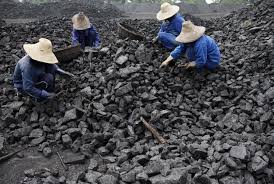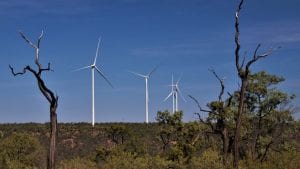The amount of coal used to generate electricity in China fell by nearly one-quarter in the month of August, according to new data – a blip on the global coal consumption radar that could soon become the norm, as the Chinese government commits to a 2014 target of slashing thermal coal imports and more and more major international funds join the fossil fuel divestment movement.
Deutsche Bank reported on Monday that a survey of thermal coal used in China by six major coastal electric utilities shows that consumption declined by 23 per cent yoy during the August-September period.
According to Deutsche, these utilities include three of China’s five largest state-owned utilities, serving coastal demand regions including Zhejiang, Shanghai and Guangdong, and account for annualised 2014 thermal coal consumption of 233 mt, or 11 per cent of Chinese utility demand for thermal coal.
Deutsche says the main drivers behind this reduced consumption include lower top-line power demand growth, and strong hydropower output over the course of the Chinese summer (Figures 2 and 3, above). The report says China’s high hydropower output will decline on a seasonal basis, but will likely remain above 2013 levels thanks to capacity expansions of 13GW in the first half of 2014.
“Additionally, the government mandate to reduce thermal coal imports this year by 40 mt year on year will trigger the first annual fall in China’s thermal coal imports since it became a net importer in 2009,” says the report.
“Compliance with this mandate is likely to be enhanced by the fact that the amount of import cuts have been individually assigned to the largest power utilities. According to McCloskey, power group CEOs will be held responsible for these cuts, and penalties will include reduced power generation quotas. Even a 50% implementation of the mandate would imply an 8% drop in China coal imports this year, which signals further weakness in thermal coal FOB prices into 2015, in our view.”
But as power companies respond to government mandates, global investment groups and superannuation funds are trying to stay ahead of any financial fallout from what is now widely considered to be the inevitable sharemarket impact of global action to combat climate change.
In Australia this week, the $8 billion Local Government Super Fund announced it would divest $25 million of shares in companies that generate more that one-third of their income from “high carbon sensitive” activities, including coal and tar sands mining and coal-fired power generation.
The fund, which invests the retirement savings of 90,000 NSW council employees, said the decision was “largely economical,” driven by the view that governments will soon need to start taking action on climate change, and that this would have “a detrimental effect on heavy carbon emitting companies.”
The Australian Financial Review reported today that the new divestment policy would see some $15 million in AGL Energy and Whitehaven Coal shares sold.
The move by the LGSF follows that of the Australian National University, which last week announced it was dumping stocks linked with oil and resources and re-framing its investment policy along sustainable lines.
And this is just the beginning. As Bloomberg New Energy Finance noted in a report released in August, in the past two years dozens of public and private institutions have announced plans to divest their fossil fuel holdings because of environmental concerns, ethical investment strategies, or worries that assets might become “stranded” by emission regulations.
Last year the World Bank announced it would not fund any new coal power plants “except in exceptional circumstances”, with similar restrictions on new coal generation investments also announced by US, Scandinavian, European and UK development banks.
And at the start of 2014, 17 US philanthropic groups with combined assets of about $US1.8 billion promised to sell their investments in fossil fuel companies and instead put their money into clean-energy technology.
Last month, in the US, the heirs to the Big Oil derived Rockefeller fortune withdrew their funds from oil, gas and coal investments, calling it “astute business.”
In fact, the latest tally says more than 800 global investors – including foundations like the Rockefeller Brothers, religious groups, healthcare organisations, cities and universities – have pledged to withdraw a total of $50 billion from fossil fuel investments over the next five years.
But, as the BNEF report also noted, the $5 trillion global shift out of fossil fuels will be “far from easy,” requiring a massive scale-up of new investment vehicles.
US-based investment fund BlackRock, for example – the world’s largest investor in oil and gas stocks – holds $140 billion in just its top 25 holdings. And many national governments – including China – are also major strategic investors in fossil fuels.
And the fossil fuel industry is, of course, starting to fight back. As the AFR reports, Whitehaven Coal head Paul Flynn called the coal divestment
campaign “green imperialism at its worst,” in August.
And Australia’s Minerals Council released a report on Monday estimating that switching to a super fund that does not include fossil fuel on its portfolio could cost a 45 year-old investor almost $58,000 in lost retirement savings, claiming funds that removed fossil fuels charged higher fees and lacked diversification.
For the Local Governments Super Fund, the answer to this will partly lie in switching its fossil fuel investments to uranium stocks – the restriction upon which will be lifted on the grounds that renewable energy alone is unlikely to be able to fill the gap created by coal.
It is realistic to expect that China and India will need uranium to move to a low-carbon economy,” said LGS chief Peter Lambert. “Uranium is a reasonable substitute for them to adopt.”











